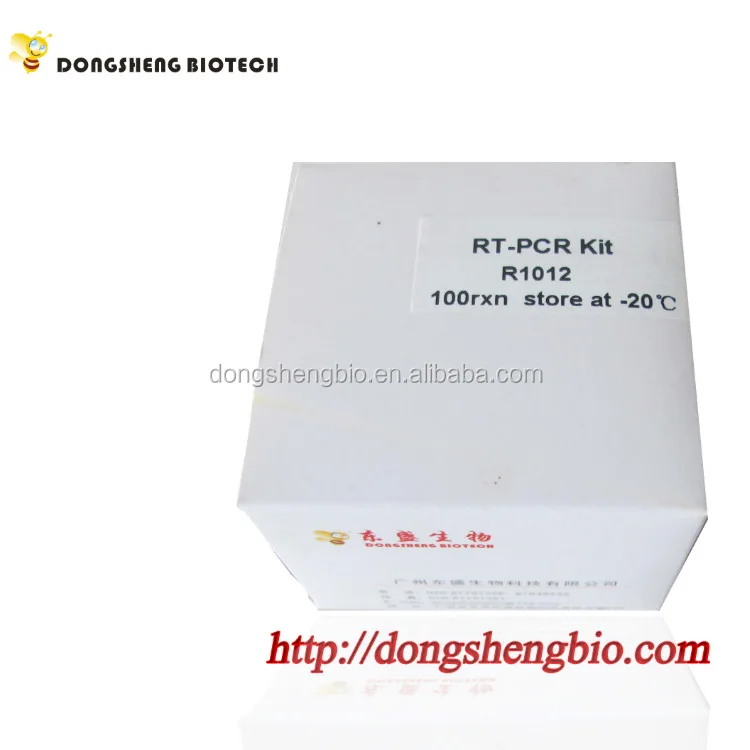Комплект для реверсивной транскрипции RT
- Категория: Специальные реактивы >>>
- Поставщик: Guangzhou,Dongsheng,Biotech,Co.,Ltd.
Поделиться:
Описание и отзывы
Трекер стоимости
| Месяц | Минимальная цена | Макс. стоимость |
|---|---|---|
| Sep-16-2025 | 0.34 $* | 0.1 $* |
| Aug-16-2025 | 0.55 $* | 0.4 $* |
| Jul-16-2025 | 0.83 $* | 0.34 $* |
| Jun-16-2025 | 0.88 $* | 0.11 $* |
| May-16-2025 | 0.72 $* | 0.24 $* |
| Apr-16-2025 | 0.58 $* | 0.58 $* |
| Mar-16-2025 | 0.86 $* | 0.38 $* |
| Feb-16-2025 | 0.5 $* | 0.95 $* |
| Jan-16-2025 | 0.8 $* | 0.58 $* |
Характеристики
RT-PCR Kit
For research use only
Components of the kit
Component | R1011(20 rxns) | R1012(100 rxns) |
M-MLV (200U/ul) | 20 ul | 100 ul |
RNasin (40U/u) | 12 ul | 60 ul |
Oligo(dT)15 (50u) | 20 ul | 100 ul |
Random hexamer primer (50uM | 20 ul | 100 ul |
5x First-strand Buffer | 80 ul | 400 ul |
RNase-free ddH2O | 1 ml | 1 ml x5 |
dNTPs(10mM each) | 50 ul | 250 ul |
Storage
All components of the kit should be stored at -20°C. Keep control RNA at -70°C for longer storage.
Description
RT-PCR Kit is optimized to synthesize first-strand cDNA from purified poly(A)+ or total RNA. The RT-pcr kit for RT-PCR delivers increased cDNA yields, high sensitivity, and full-length transcripts in a convenient format. You get all of the components you need for successful first-strand cDNA synthesis, saving your time and ensuring your success with every experiment. The kit Reverse Transcriptase is a version of M-MLV RT that has been engineered to reduce RNase H activity and provide increased thermal stability. The enzyme is used to synthesize cDNA at a temperature range of 42-55°C, providing increased specificity, higher yields of cDNA, and more full-length product than other reverse transcriptases.
Applications
First strand cDNA synthesis for RT-PCR .
Construction of cDNA libraries.
One-step RT-PCR
Primer extension
Important notes
Avoiding ribonuclease contamination
RNA purity and integrity is essential for synthesis of full-length cDNA. RNA can be degraded RNase A, which is a highly stable contaminant found in any laboratory environment. All components of the kit have been rigorously tested to ensure that they are RNase free. To prevent contamination both the laboratory environment and all prepared solutions must be free of RNases. General recommendations to avoid RNase contamination:
- DEPC-treat all tubes and pipette tips to be used in cDNA synthesis or use certified nuclease-free labware.
- Wear gloves when handling RNA and all reagents, as skin is a common source of RNases. Change gloves frequently.
- Use RNase-free reagents, including high quality water (e.g., DEPC-treated Water).
- Use an RNase inhibitor, such as Dongsheng RNasin (#R2011) to protect RNA from the activity of RNases.
- Keep all kit components tightly sealed when not in use. Keep all tubes tightly closed during the reverse transcription reaction.
Template RNA
Total cellular RNA isolated by standard methods is suitable for use with the kit. Purified RNA must be free of salts, metal ions, ethanol and phenol to avoid inhibiting the cDNA synthesis reaction. Trace contaminants can be removed by ethanol precipitation of the RNA followed by two washes of the pellet with cold 75% ethanol. For RT-PCR applications, template RNA must be free of DNA contamination. Prior to cDNA synthesis, RNA can be treated with DNase I to remove trace amounts of DNA. DNase I must be obtained by the user. Always perform a control (RT-minus) reaction which includes all components for RT-PCR except for the reverse transcriptase enzyme.
RNase H Digestion
The sensitivity of the PCR step can be increased (especially for long templates) by removing the RNA template from the cDNA:RNA hybrid molecule by digestion with RNase H after first-strand synthesis. Presence of RNase H during first-strand synthesis will degrade the template mRNA, resulting in decreased full-length cDNA synthesis and decreased yields of first-strand cDNA.
Primers
Synthesis of first strand cDNA can be primed with either oligo(dT)15 primer, random primers or gene-specific primers.
Oligo(dT)15 primes cDNA synthesis from the poly(A) tail present at the 3’-end of eukaryotic mRNA. Random Primers initiate cDNA synthesis from the total RNA population (rRNA and mRNA). Therefore, using random primers for first strand synthesis results in a greater complexity of the generated cDNA compared with the oligo(dT)15 primer. As a consequence, the sensitivity and specificity of subsequent PCR reactions may be reduced. However, there are several applications where it is beneficial to use random primers, such as cDNA synthesis using mRNAs without a poly(A) tail, or cDNA synthesis using poly(A)-enriched RNA samples.
Gene-specific primers are used to synthesize specifi c cDNA from a pool of total RNA or mRNA and must be obtained by the user.
First Strand cDNA synthesis procedure
The first strand cDNA reaction can be performed as an individual reaction or as a series of parallel reactions with different RNA templates. Therefore, the reaction mixture can be prepared by combining reagents individually or a master mix containing all of the components except template RNA can be prepared. Depending on the structure of the RNA template, separate steps for RNA denaturation and primer annealing may improve RT-PCR results.




-----------------------------------------------------------------------------------------------------------------------------------------------------------------------------


Dongsheng Biotech PCR Reagents are looking for distributors and providing OEM service
Dongsheng Biotech offers different series of products to help you achieve PCR success. For enzymes, our Taq Polymerase, HS Taq DNA Polymerase, FS Taq DNA Polymerase, Pfu DNA Polymerase and Fusion Pfu DNA Polymerase provide high fidelity, efficient, sensitivity PCR performance. We also have Long Taq DNA Polymerase for long PCR performance.












